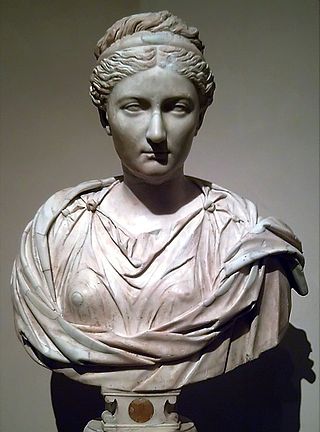Related Research Articles

Titus Aelius Hadrianus Antoninus Pius was Roman emperor from AD 138 to 161. He was the fourth of the Five Good Emperors from the Nerva–Antonine dynasty.

Marcus Aurelius Antoninus was Roman emperor from 161 to 180 and a Stoic philosopher. He was a member of the Nerva–Antonine dynasty, the last of the rulers later known as the Five Good Emperors and the last emperor of the Pax Romana, an age of relative peace, calm, and stability for the Roman Empire lasting from 27 BC to 180 AD. He served as Roman consul in 140, 145, and 161.

Lucius Aurelius Verus was Roman emperor from 161 until his death in 169, alongside his adoptive brother Marcus Aurelius. He was a member of the Nerva–Antonine dynasty. Verus' succession together with Marcus Aurelius marked the first time that the Roman Empire was ruled by more than one emperor simultaneously, an increasingly common occurrence in the later history of the Empire.

Lucius Aelius Caesar was the father of Emperor Lucius Verus. In 136, he was adopted by the reigning emperor Hadrian and named heir to the throne. He died before Hadrian and thus never became emperor. After Lucius' death, he was replaced by Antoninus Pius, who succeeded Hadrian the same year.

Annia Galeria Faustina the Younger was Roman empress from 161 to her death as the wife of emperor Marcus Aurelius, her maternal cousin. Faustina was the youngest child of emperor Antoninus Pius and empress Faustina the Elder. She was held in high esteem by soldiers and her husband as Augusta and Mater Castrorum and was given divine honours after her death.
Gaius Avidius Cassius was a Syrian Roman general and usurper. He was born in Cyrrhus, and was the son of Gaius Avidius Heliodorus, who served as praefectus or governor of Roman Egypt, and Julia Cassia Alexandra, who was related to a number of royal figures, including her descent from both Augustus and Herod the Great. He began his military career under Antoninus Pius, rising to the status of legatus legionis. He served during the Parthian war of Lucius Verus, in which he distinguished himself, for which he was elevated to the Senate, and later made Imperial legate. During the Bucolic War, he was given the extraordinary title of Rector Orientis, giving him Imperium over all of the eastern provinces of the Roman Empire.

Annia Aurelia Galeria Lucilla or Lucilla was the second daughter of Roman Emperor Marcus Aurelius and Roman Empress Faustina the Younger. She was the wife of her father's co-ruler and adoptive brother Lucius Verus and an elder sister to later Emperor Commodus. Commodus ordered Lucilla's execution after a failed assassination and coup attempt when she was about 33 years old.

Salonia Matidia was the daughter and only child of Ulpia Marciana and wealthy praetor Gaius Salonius Matidius Patruinus. Her maternal uncle was the Roman emperor Trajan. Trajan had no children and treated her like his daughter. Her father died in 78 and Matidia went with her mother to live with Trajan and his wife, Pompeia Plotina.
Marcus Annius Verus was the paternal grandfather and adoptive father of the Roman Emperor Marcus Aurelius, and father-in-law of emperor Antoninus Pius.
Marcus Annius Libo was a Roman Senator active in the early second century AD.

The early life of Marcus Aurelius spans the time from his birth on 26 April 121 until his accession as Roman emperor on 8 March 161.
The Roman–Parthian War of 161–166 was fought between the Roman and Parthian Empires over Armenia and Upper Mesopotamia. It concluded in 166 after the Romans made successful campaigns into Lower Mesopotamia and Media and sacked Ctesiphon, the Parthian capital.

The reign of Marcus Aurelius began with his accession on 7 March 161 following the death of his adoptive father, Antoninus Pius, and ended with his own death on 17 March 180. Marcus first ruled jointly with his adoptive brother, Lucius Verus. They shared the throne until Lucius' death in 169. Marcus was succeeded by his son Commodus, who had been made co-emperor in 177.

Avidia was a well-connected noble Roman woman. She is among the lesser known members of the ruling Nerva–Antonine dynasty of the Roman Empire.

The gens Annia was a plebeian family at ancient Rome. Livy mentions a Lucius Annius, praetor of the Roman colony of Setia, in 340 BC, and other Annii are mentioned at Rome during this period. Members of this gens held various positions of authority from the time of the Second Punic War, and Titus Annius Luscus attained the consulship in 153 BC. In the second century AD, the Annii gained the Empire itself; Marcus Aurelius was descended from this family.
Ceionia Fabia was a noble Roman woman and a member of the ruling Nerva–Antonine dynasty of the Roman Empire.

Vibia Aurelia Sabina was the youngest daughter and child born to Roman Emperor Marcus Aurelius and Roman Empress Faustina the Younger. She was a sister to Roman Empress Lucilla and Roman Emperor Commodus. Her maternal grandparents were Roman Emperor Antoninus Pius and Roman Empress Faustina the Elder and her paternal grandparents were Domitia Lucilla and praetor Marcus Annius Verus.
Marcus Ummidius Quadratus Annianus (138–182) was a Roman Senator and the nephew of the Emperor Marcus Aurelius. He was involved in an unsuccessful plot to assassinate his cousin the Emperor Commodus, which led to his execution afterwards.

Gaius Julius Sohaemus was a Roman client king of Armenia.
Marcus Annius Libo was a Roman senator. He was suffect consul in the nundinium of January-April 161 with Quintus Camurius Numisius Junior as his colleague. Libo was the nephew of emperor Antoninus Pius, and cousin to emperor Marcus Aurelius.
References
- 1 2 Unknown; Anthony R. Birley (trans.) (1976). Lives of the Later Caesars . Penguin Classics. pp. 123, 146–147. ISBN 0-14-044308-8.
- ↑ Birley, Anthony R. (1993). Marcus Aurelius: A Biography. London: Routledge. p. 243. ISBN 0-415-17125-3.
- ↑ McGinn, Thomas A.J. (1998). Prostitution, Sexuality, and the Law in Ancient Rome. Oxford: Oxford University Press. p. 103. ISBN 978-0-19-516132-8.
- ↑ Duff, Arnold Mackay (1958). Freedmen in the Early Roman Empire. Michigan: University of Michigan Press.
![]() This article incorporates text from a publication now in the public domain : Smith, William, ed. (1870). "Agaclytus". Dictionary of Greek and Roman Biography and Mythology .
This article incorporates text from a publication now in the public domain : Smith, William, ed. (1870). "Agaclytus". Dictionary of Greek and Roman Biography and Mythology .